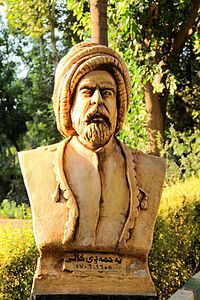| Revision as of 19:41, 17 July 2020 editGreenC bot (talk | contribs)Bots2,565,112 edits Reformat 1 archive link. Wayback Medic 2.5← Previous edit | Revision as of 07:04, 19 August 2020 edit undoSemsûrî (talk | contribs)Autopatrolled, Extended confirmed users, Pending changes reviewers62,280 editsm →See also: redirectTag: Visual editNext edit → | ||
| Line 43: | Line 43: | ||
| ==See also== | ==See also== | ||
| * ] | * ] | ||
| * ] | |||
| * ] | * ] | ||
| * ] | * ] | ||
Revision as of 07:04, 19 August 2020
For the village in Iran, see Ahmad Khani, Iran.
| Ahmad Khani | |
|---|---|
 A bust of Ahmad Khani in Iraqi Kurdistan A bust of Ahmad Khani in Iraqi Kurdistan | |
| Born | 1650 Hakkari, Hakkâri Province |
| Died | 1707 (Doğubayazıt), Ağrı |
| Nationality | Kurdish |
| Occupation(s) | Writer, poet, astronomer, philosopher |
| Years active | 17th century |
| Academic background | |
| Influences | Al-Farabi, Ferdowsi, Malaye Jaziri, Ali Hariri, Faqi Tayran |
| Academic work | |
| Influenced | Abdurrahman Sharafkandi, Mastoureh Ardalan, Nalî, Haji Qadir Koyi, Hemin Mukriyani |
Ahmad Khani, also spelled Ahmad-i Khani (Template:Lang-ku; 1650, Hakkari – 1707, Doğubayazıt), was a Kurdish writer, poet, astronomer and philosopher. He was born amongst the Khani's tribe in Hakkari province in present-day Turkey. He moved to Bayezid in Ritkan province and settled there. Later he started with teaching Kurdish (Kurmanji) at basic level. Khani was fluent in Kurdish, Arabic and Persian. He wrote his Arabic-Kurdish dictionary "Nûbihara Biçûkan" (The Spring of Children) in 1683 to help children with their learning process.
His most important work is the Kurdish classic love story "Mem and Zin" (Mem û Zîn) (1692), which has been translated to many languages including Arabic, Russian and Turkish. This epic has several facets and has been interpreted from different angles, but one its most important parts is its preface in which Khani calls for a Kurdish state. Therefore, many consider Mam and Zin to be the first expression of Kurdish nationalism.
His other work include a book called Eqîdeya Îmanê (The Path of Faith), which is part poem and part prose. The book explains the five pillars of Islamic faith. It was published in 2000 in Sweden.
Biography
| This section is empty. You can help by adding to it. (July 2010) |
Works
Books
- Mem û Zîn (Mem and Zin), see for its French translation, see for its English translation,
- Eqîdeya Îmanê (The Path of Faith)
- Eqîdeya Îslamê (Basics of Islam)
- Nûbihara Biçûkan (The Spring of Children)
- Erdê Xweda (Astronomy and Geography book)
- Dîwana Helbestan
References and notes
- "kurdish Academy – Just another WordPress site". kurdishacademy.org. Archived from the original on 1 April 2019. Retrieved 21 January 2019.
- "EHMEDÊ XANÎ:HEP ULUSUNUN SORUNUNA ÇÖZÜM ARADI" (in Turkish). Archived from the original on 1 August 2015.
- "The Kurdish Language and Literature". Institutkurde.org.
- ^ "AḤMAD-E ḴĀNI – Encyclopaedia Iranica". www.iranicaonline.org. Retrieved 30 June 2020.
- Bruinessen, Martin van. "Ehmedê Xanî's Mem û Zîn and its role in the emergence of Kurdish nationalism". Abbas Vali (ed.), Essays on the origins of Kurdish nationalism, Costa Mesa, Cal.: Mazda Publishers, 2003, pp. 40-57.
See also
External links
- Works by Ehmedê Xanî at LibriVox (public domain audiobooks)

- Ahmad Khani, Kurdish Academy of Language KAL
- Our Trouble by Ehmedê Xanî, Noahs Ark Holidays
- Ahmad Khani, Encyclopædia Iranica
| Kurdish literature | |
|---|---|
| Texts |
|
| Before and in 1400s |
|
| 1500s-1600s |
|
| 1700s |
|
| 1800s |
|
| Contemporary |
|
| Related topics | |
| Muslim historians | |||||||||||||||||||||||||||||||||||||||||||||||||||||||||||||||||||||||||||||||||||||
|---|---|---|---|---|---|---|---|---|---|---|---|---|---|---|---|---|---|---|---|---|---|---|---|---|---|---|---|---|---|---|---|---|---|---|---|---|---|---|---|---|---|---|---|---|---|---|---|---|---|---|---|---|---|---|---|---|---|---|---|---|---|---|---|---|---|---|---|---|---|---|---|---|---|---|---|---|---|---|---|---|---|---|---|---|---|
| Historians |
| ||||||||||||||||||||||||||||||||||||||||||||||||||||||||||||||||||||||||||||||||||||
| Notable works |
| ||||||||||||||||||||||||||||||||||||||||||||||||||||||||||||||||||||||||||||||||||||
| Concepts | |||||||||||||||||||||||||||||||||||||||||||||||||||||||||||||||||||||||||||||||||||||
This article about a Kurdish poet is a stub. You can help Misplaced Pages by expanding it. |